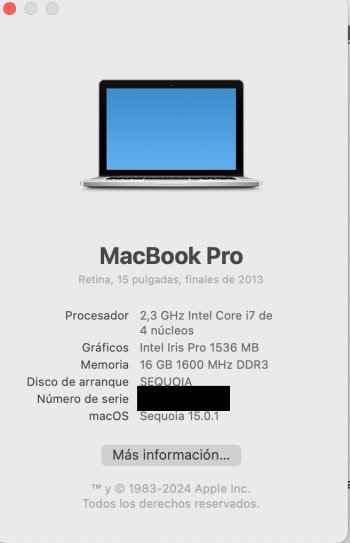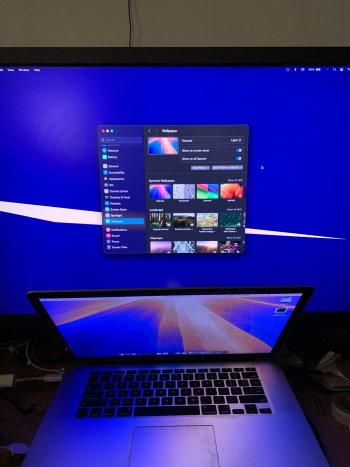OTA full update to b6 Version 15.1 Beta (24B5070a) went fine on my MBA 7,2.
Got a tip for us?
Let us know
Become a MacRumors Supporter for $50/year with no ads, ability to filter front page stories, and private forums.
macOS 15 Sequoia on Unsupported Macs Thread
- Thread starter flagers
- WikiPost WikiPost
- Start date
- Sort by reaction score
You are using an out of date browser. It may not display this or other websites correctly.
You should upgrade or use an alternative browser.
You should upgrade or use an alternative browser.
- Status
- The first post of this thread is a WikiPost and can be edited by anyone with the appropiate permissions. Your edits will be public.
Thanx, jepp i know hope was that 15.0.1 fixes that but not on all Macs in my case was just for information 15.1 b6 on test MacPro5,1 went fine so far - so fingers crossed ;-)It seems to be a problem on some supported macs too. https://mjtsai.com/blog/2024/09/18/macos-firewall-regressions-in-sequoia/
I had a similar issues but after playing around with the monitor resolutions it worked....next time again the same procedure...I download a lot of content to my Mac like movies and tv shows. I use AirPlay to connect to my living room appletv and watch on the big screen. Unfortunately airplay video is non existent, only the audio goes through. I have installed Sequoia a few times when I see the nightly patcher gets changes, figuring maybe they adjust something. Metallib pkg is installed every time Because when I do an installation I plug an Ethernet cable in and it goes looking for metallib
it's never displayed on my machines either but I can still accept...On my MBP11,3, license agreements are not displayed, whether from full installers or software updates; while on my MBP11,1 (without discrete graphics), they are displayed: anyone else has this problem…? Here’s a screenshot of the full macOS 15.0.1 installer: as can be seen, no license agreement is displayed. Maybe something to do with the Nvidia Kepler card (even if the same happens also forcing Intel Haswell)…?
View attachment 2434074
OTA update to 24B5070a using 2.0.2 done without major issues.
Side note: More often now rebooting the machine (not linked to installation process) ends up in a "no entry" sign wich can be solved with a restart. Since nobody else reports a similar issue, I assume it's a problem linked to this specific SSD.
Side note: More often now rebooting the machine (not linked to installation process) ends up in a "no entry" sign wich can be solved with a restart. Since nobody else reports a similar issue, I assume it's a problem linked to this specific SSD.
Although Jessie's Flying excellent YouTube channel reports that Sequoia installs on MBP 13,3 OK (it does), he did not verify iMessages iCloud login issues, which still plague the 13,x series even with today's 15.1 beta 6 release. Have any devs taken a look at this problem?
I had forgotten the networking issues were tied to the macOS firewall. Since I don't use the macOS firewall, and rely on the firewall of the router, sounds like I shouldn't have any of the issues then.
I have an Asus RT-AX86U router. So I would imagined it's firewall is better, or at least on par with the macOS one.
I have an Asus RT-AX86U router. So I would imagined it's firewall is better, or at least on par with the macOS one.
What is the SSD model? I have a Samsung EVO 128GB on my MBP4,1 Early 2008. I had the no entry sign displayed after updating macOS 14something to macOS 15.0. Restart solved the problem.OTA update to 24B5070a using 2.0.2 done without major issues.
Side note: More often now rebooting the machine (not linked to installation process) ends up in a "no entry" sign wich can be solved with a restart. Since nobody else reports a similar issue, I assume it's a problem linked to this specific SSD.
Automatic installation went fine on my MBA7,2 with Samsung 2 tb 970 evo ssd.OTA update to 24B5070a using 2.0.2 done without major issues.
Side note: More often now rebooting the machine (not linked to installation process) ends up in a "no entry" sign wich can be solved with a restart. Since nobody else reports a similar issue, I assume it's a problem linked to this specific SSD.
Its a Samsung SSD 870 EVO 500GB.What is the SSD model? I have a Samsung EVO 128GB on my MBP4,1 Early 2008. I had the no entry sign displayed after updating macOS 14something to macOS 15.0. Restart solved the problem.
rMBP10,1 2012 updated successfully OTA from the previous beta to 15.1 b6 (24B5070a) + OCLP 2.2.0n (2024-10-05).
Mac seems to be snappier than crocodile sandwiches.
No issues found so far. I haven't tested the external monitor via HDMI yet; wallpaper was flakey before which was the only real problem for my own use cases on the previous beta.
Edit: External display wallpaper is still hosed, shows a random abstract geometrical shape. Still usable though.
Mac seems to be snappier than crocodile sandwiches.
No issues found so far. I haven't tested the external monitor via HDMI yet; wallpaper was flakey before which was the only real problem for my own use cases on the previous beta.
Edit: External display wallpaper is still hosed, shows a random abstract geometrical shape. Still usable though.
Attachments
Last edited:
Hey all, I've got a question to sort out a bit of confusion. I was watching a video either by Jesse's Flying, or Lance from Mac sound solutions, and they stated, they couldn't select 4K on YouTube videos using Safari. I just checked, on my Monterey install on this iMac 17,1 with Safari 17, and I was able to select 4K just fine. In fact, I use a program called Downie for downloading videos, and it now defaults to AV1 for YouTube, and I grabbed a 4K AV1 video as a test, and that also played offline without issues. I remember older versions of Safari were limited to 1080p for YouTube, but it was either Mojave, or Catalina, that added 4K support for Safari. I think I was Abe to do 4K in Safari under OpenCore as well. So I was curious as to why they were saying it's limited.
I'm not recommending this - just asking. For those who revert OCLP root patches in order to apply incremental macOS updates, do you also need to temporarily disable BluetoolFixup.kext? I have seen reports and have experienced situations where incremental macOS upgrades fail (requiring the full macOS installer instead of the incremental) when BluetoolFixup.kext is enabled. Temporarily disabling BluetoolFixup.kext permits the incremental upgrade to proceed without issues. After the incremental upgrade is complete, BluetoolFixup.kext can be enabled.
Just curious. Thanks.
FYI: For those who care, BluetoolFixup.kext 2.6.9 has been updated for Sequoia so that it does not need -btlfxbeta/-lilubetaall boot-args.
Just curious. Thanks.
FYI: For those who care, BluetoolFixup.kext 2.6.9 has been updated for Sequoia so that it does not need -btlfxbeta/-lilubetaall boot-args.
Last edited:
I wouldn't assume the Asus router has a better firewall. I would assume the opposite actually. Consumer routers have a fairly poor history in regards to security. I wouldn't say MacOS has a stellar history either, but I do think you are at least likely to get a relatively timely fix to an issue. I think there are Asus routers that have been abandoned with no fixes. Maybe someone will correct me if I'm mistaken.I had forgotten the networking issues were tied to the macOS firewall. Since I don't use the macOS firewall, and rely on the firewall of the router, sounds like I shouldn't have any of the issues then.
I have an Asus RT-AX86U router. So I would imagined it's firewall is better, or at least on par with the macOS one.
To my knowledge, running incremental updates wasn’t possible anymore since… quite a while?I'm not recommending this - just asking. For those who revert OCLP root patches in order to apply incremental macOS updates, do you also need to temporarily disable BluetoolFixup.kext? I have seen reports and have experienced situations where incremental macOS upgrades fail (requiring the full macOS installer instead of the incremental) when BluetoolFixup.kext is enabled. Temporarily disabling BluetoolFixup.kext permits the incremental upgrade to proceed without issues. After the incremental upgrade is complete, BluetoolFixup.kext can be enabled.
Just curious. Thanks.
FYI: For those who care, BluetoolFixup.kext 2.6.9 has been updated for Sequoia so that it does not need -btlfxbeta/-lilubetaall boot-args.
Everything unflashable to OpenWRT should be avoided.I wouldn't assume the Asus router has a better firewall.
Depends on the Mac SMBIOS model and possible but not recommended. Note the way I started my post.To my knowledge, running incremental updates wasn’t possible anymore since… quite a while?
My statements were in regards to two aspects with Asus vs the macOS firewall.I wouldn't assume the Asus router has a better firewall. I would assume the opposite actually. Consumer routers have a fairly poor history in regards to security. I wouldn't say MacOS has a stellar history either, but I do think you are at least likely to get a relatively timely fix to an issue. I think there are Asus routers that have been abandoned with no fixes. Maybe someone will correct me if I'm mistaken.
1. Asus is a higher end router than the average consumer would have.
2. Asus firmware iis Linux based and has a lot of the same tools a Linux system would have. (including ssh and a shell)
I believe they use the Linux firewall, I'm not sure if Apple uses a BSD based firewall, or what now. Also, I'm talking whole network protection vs a single computer. I've relied on the firewall in routers for years vs on the computer and haven't had any issues of being hacked, or suspicious activity on the network. Also, AsusWRT is as close as you'd probably get to a commercially maintained version of DDWRT, which is usually suggested over stock firmware if the router can run it. There is also the Merlin firmware for Asus routers, so there are options.
Just giving feedback in case you didn't know.
I am familiar with openWRT as well. However, I never tried it, because it was the one at the time I was using the open firmwares to have the least support for things. Not sure what it's like today.Everything unflashable to OpenWRT should be avoided.
I'm not recommending this - just asking. For those who revert OCLP root patches in order to apply incremental macOS updates, do you also need to temporarily disable BluetoolFixup.kext? I have seen reports and have experienced situations where incremental macOS upgrades fail (requiring the full macOS installer instead of the incremental) when BluetoolFixup.kext is enabled. Temporarily disabling BluetoolFixup.kext permits the incremental upgrade to proceed without issues. After the incremental upgrade is complete, BluetoolFixup.kext can be enabled.
Just curious. Thanks.
FYI: For those who care, BluetoolFixup.kext 2.6.9 has been updated for Sequoia so that it does not need -btlfxbeta/-lilubetaall boot-args.
Never had to manually do anything only revert patches is needed.
I checked the OCLP-generated OC EFI for your Mac (MBP11,3 - correct?) and OCLP does not inject BluetoolFixup.kext for your Mac.Never had to manually do anything only revert patches is needed.
Register on MacRumors! This sidebar will go away, and you'll see fewer ads.





